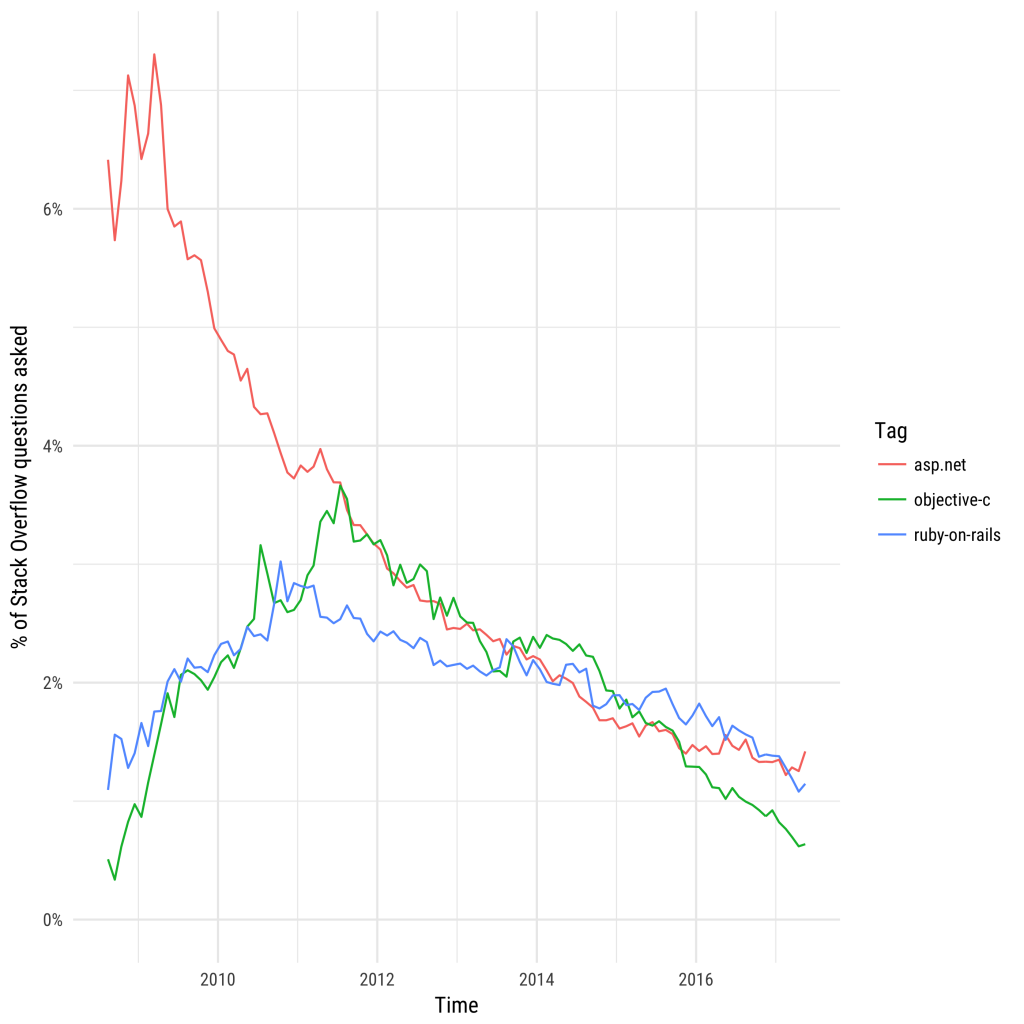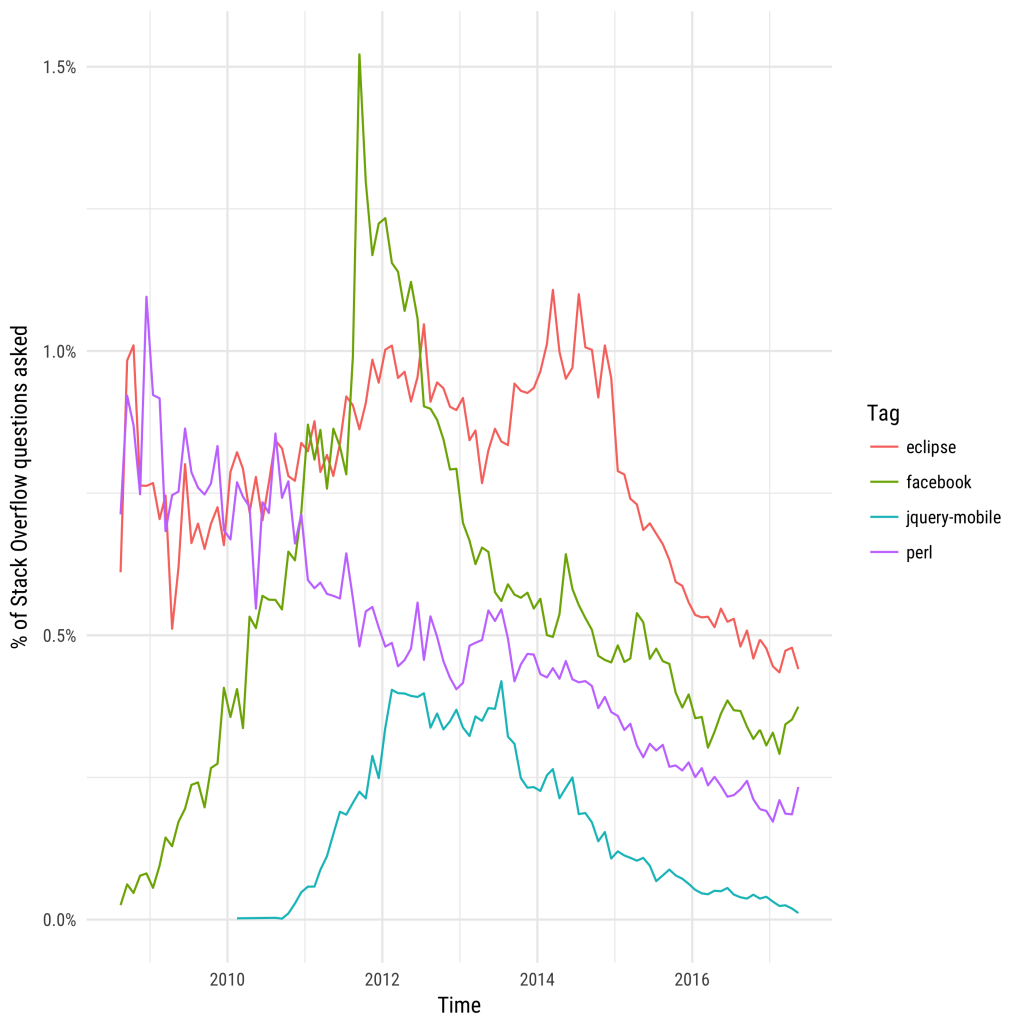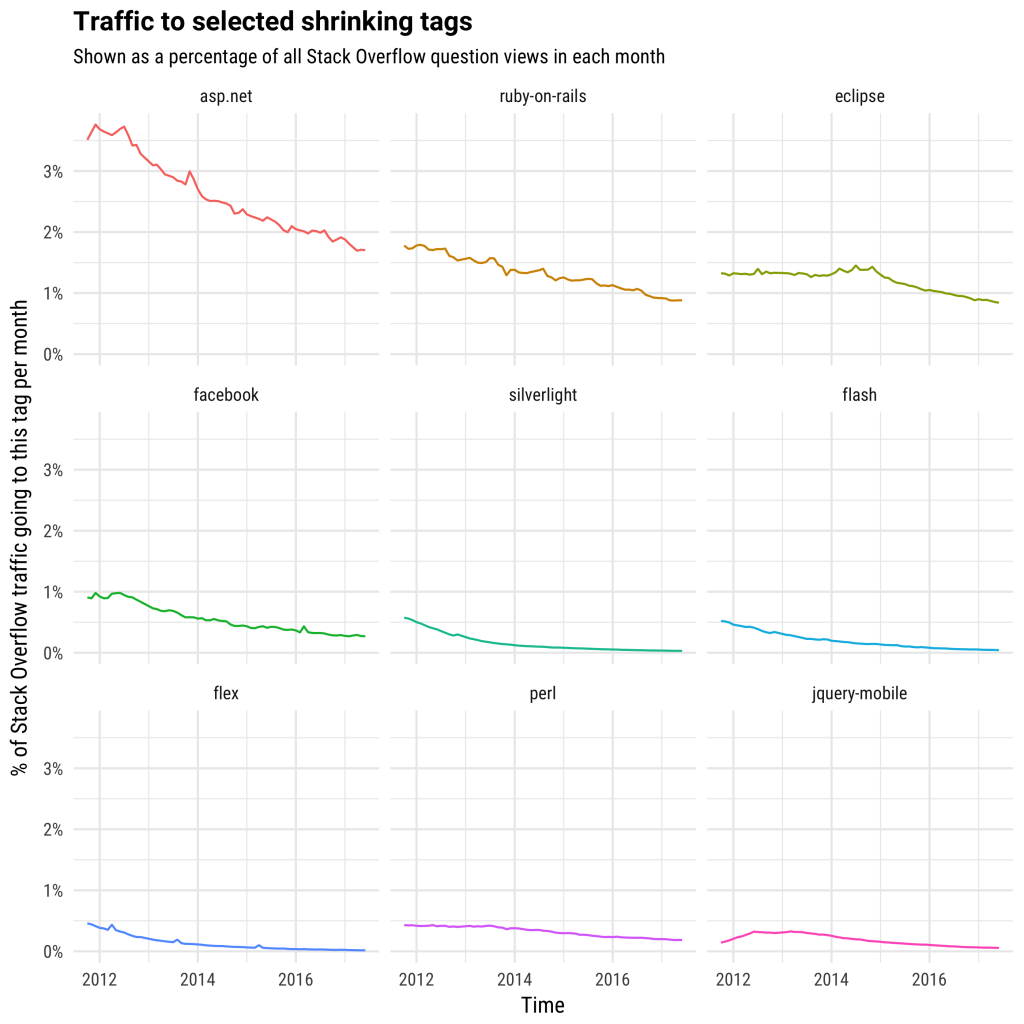Flash is dead: who's next?
Last week, Adobe announced that it would stop supporting Flash by 2020. In a sense, this is even unexpected: I still sometimes come across pages on which it is required, and among software developers he still has supporters. But if you look at it from the other side, everything went to that. Often, technology care can be predicted in advance, if you track statistics on its use in the IT community. One of the most famous sources of this information is our tool Stack Overflow Trends , and it shows that the frequency of questions about Flash declined in 2010:

Such an unexpected change in the fate of Flash allows us to conclude: the conventional wisdom that Apple ruined Flash when in 2010 it decided not to support it on the iPad, perhaps in some way it is true.
Once we had the opportunity to predict the Flash crisis, let's draw more data from the Stack Overflow to see what other technologies are in decline.
In the past ten years, Flash has had enough defenders ( here is a small historical background ), although the fact that it is less and less used in the development was striking in 2011. Maybe there are some other technologies that are still alive and healthy at first glance, but have recently begun to lose ground?
')

To answer this question, we analyzed the questions that were asked on the Stack Overflow in the appropriate time period - data was taken from the same Stack Overflow Trends. We monitored trends over the past five years (to include in the study and those tags that were on the rise, reached a peak and went down) and measured the rate of decline in popularity for each of the selected technologies. All the information used is in the public domain (you can download it using this request ), so I’ll listen with interest to what conclusions other developers will come to.
We believed that interest in technology is fading away if the number of issues related to it has decreased on average by 10% per year. If you accept this criterion, which technologies lose users the fastest?
Beginning in 2010, Flex tags (Flash-based web application framework) and Microsoft's Silverlight are leading in this regard. Both are losing ground much faster than Flash; Flex in particular began to pass very sharply after it reached its peak of popularity in 2010. The number of references to both technologies on the site was reduced by two orders of magnitude.

One of them is already a thing of the past: in 2015, Microsoft announced its intention to stop supporting Silverlight by 2021. Flex, strictly speaking, is still supported (only since 2011, the Apache Foundation , and not Adobe, has been working on it), but considering that Flash was written off and that Flex is less likely to be involved in the development issues, it’s hardly possible to call it technology there is a future.

Among other popular technologies (that is, those who collected at least 100,000 questions from 2010 to today), there are other applicants whose popularity has noticeably decreased. The frequency of questions about ASP.NET, a web framework from Miscrosoft, has steadily decreased since the foundation of the resource. Here it is necessary to take into account the fact that in the early stages of the site’s existence, C # developers prevailed in its audience, but the reason may also lie in the fact that Microsoft plays an increasingly less important role in web development.
The regularity of publishing questions about Ruby on Rails gained momentum until 2011, and then gradually began to decline. Objective-C is also in a downturn, as Swift has come to replace it as an iOS developer’s favorite language. Similarly, the “iphone” and “ipad” tags have supplanted the general “ ios ” tag for questions about the Apple mobile platform ( we take a closer look at these trends in a post about developing mobile applications ).

The list of technologies that quickly lose positions does not end there. Perl has long suffered from a lack of attention (although, in fairness, if you look at the months, it still collects more questions than dead tags like Flash or Flex). The maximum number of questions about the platform for developers from Facebook came in 2012, since then they have steadily become less. The number of posts about the Eclipse development environment has been falling since 2014. JQuery Mobile was once a popular library for reactive web development, but judging by how actively people ask questions, the community has recently lost interest in it.
Of course, the number of questions asked about a technology does not always reflect its prevalence. Often, the developers first check to see if anyone has offered solutions to the problem in already existing posts, and only then they ask the question themselves. Perhaps when a vast database of questions accumulates, users simply turn to old posts and do not feel the need to create new ones. Then, maybe, in some of these tags the number of views of old questions grows?
So, instead of focusing on the questions asked, we can analyze the number of post views for a certain time period. We have data on views for the period from the end of 2011.
Is there a similar decline there?

In the case of those tags that we have identified in this post as dying, you can see that in general and the general traffic says the same thing as the number of questions asked. The number of views of posts about Flash, Flex and Silverlight since 2012 has dropped to almost zero. The ASP.NET and Ruby on Rails tags, although still attracting a significant amount of traffic, also began to lose users over time. Eclipse until 2014 was stable, but then went into decline.
In addition, the statistics for the majority of the tags considered indicates that traffic as an indicator of the popularity of a problem is slightly delayed compared to the number of questions. If the number of questions about a technology starts to decrease, then the traffic of existing posts will soon fall. We emphasize that this cannot be explained only by the fact that new questions receive a lot of views from people who try to answer them: 98% of Stack Overflow traffic falls on questions that were asked not on the day the statistics are collected. This rather indicates a change in attitude towards technology: when developers no longer need to ask questions, ready-made answers also become useless to them.
As Bjorn Straustrup, the author of C ++, once said, there are two types of programming languages — those that everyone complains about and those that nobody uses. I would say that the same principle works for questions.
The Stack Overflow team often takes measurements on the number of questions in order to understand how this or that technology is viable. I am often objected that this is not an indicator, because statistics on issues and traffic actually reflects only how many people do not understand how to use this or that technology, and advanced users may simply not need help. Indeed, in working with any metric, it is necessary to take into account shortcomings and data distortions, and how freely users own the technology is a factor that can influence the results and which should be taken into account.
Nevertheless, I believe that the data provided by Trends is useful and informative. Firstly, it seems to me that just as it is impossible to write all possible books, it is impossible to ask all possible questions. The Javascript tag during its existence gathered 1.4 million questions , and despite this, the frequency of publications steadily increases . If the topics for discussion related to Javascript could be exhausted, we would definitely have done it.
Secondly, if everyone who works with technology knows it completely, then the community does not develop. A sustainable environment always involves the influx of newbies who learn the basics, and the presence of experts who check where the limits of opportunity lie. And those and others during the work process constantly have questions. In 2011, a developer using Flash could argue: “Yes, Flash has recently been discussed not so actively, but this is only because the documentation is very sensible and we have already understood the basics of the work.” But time puts everything in its place.
In the future, I plan to write a post about those technologies that have a rapidly growing share of questions in the total number, and speculate on how important this will be for the entire ecosystem.

Such an unexpected change in the fate of Flash allows us to conclude: the conventional wisdom that Apple ruined Flash when in 2010 it decided not to support it on the iPad, perhaps in some way it is true.
Once we had the opportunity to predict the Flash crisis, let's draw more data from the Stack Overflow to see what other technologies are in decline.
Who is next to fly?
In the past ten years, Flash has had enough defenders ( here is a small historical background ), although the fact that it is less and less used in the development was striking in 2011. Maybe there are some other technologies that are still alive and healthy at first glance, but have recently begun to lose ground?
')

To answer this question, we analyzed the questions that were asked on the Stack Overflow in the appropriate time period - data was taken from the same Stack Overflow Trends. We monitored trends over the past five years (to include in the study and those tags that were on the rise, reached a peak and went down) and measured the rate of decline in popularity for each of the selected technologies. All the information used is in the public domain (you can download it using this request ), so I’ll listen with interest to what conclusions other developers will come to.
We believed that interest in technology is fading away if the number of issues related to it has decreased on average by 10% per year. If you accept this criterion, which technologies lose users the fastest?
Beginning in 2010, Flex tags (Flash-based web application framework) and Microsoft's Silverlight are leading in this regard. Both are losing ground much faster than Flash; Flex in particular began to pass very sharply after it reached its peak of popularity in 2010. The number of references to both technologies on the site was reduced by two orders of magnitude.

One of them is already a thing of the past: in 2015, Microsoft announced its intention to stop supporting Silverlight by 2021. Flex, strictly speaking, is still supported (only since 2011, the Apache Foundation , and not Adobe, has been working on it), but considering that Flash was written off and that Flex is less likely to be involved in the development issues, it’s hardly possible to call it technology there is a future.

Among other popular technologies (that is, those who collected at least 100,000 questions from 2010 to today), there are other applicants whose popularity has noticeably decreased. The frequency of questions about ASP.NET, a web framework from Miscrosoft, has steadily decreased since the foundation of the resource. Here it is necessary to take into account the fact that in the early stages of the site’s existence, C # developers prevailed in its audience, but the reason may also lie in the fact that Microsoft plays an increasingly less important role in web development.
The regularity of publishing questions about Ruby on Rails gained momentum until 2011, and then gradually began to decline. Objective-C is also in a downturn, as Swift has come to replace it as an iOS developer’s favorite language. Similarly, the “iphone” and “ipad” tags have supplanted the general “ ios ” tag for questions about the Apple mobile platform ( we take a closer look at these trends in a post about developing mobile applications ).

The list of technologies that quickly lose positions does not end there. Perl has long suffered from a lack of attention (although, in fairness, if you look at the months, it still collects more questions than dead tags like Flash or Flex). The maximum number of questions about the platform for developers from Facebook came in 2012, since then they have steadily become less. The number of posts about the Eclipse development environment has been falling since 2014. JQuery Mobile was once a popular library for reactive web development, but judging by how actively people ask questions, the community has recently lost interest in it.
Does all these findings confirm the number of views?
Of course, the number of questions asked about a technology does not always reflect its prevalence. Often, the developers first check to see if anyone has offered solutions to the problem in already existing posts, and only then they ask the question themselves. Perhaps when a vast database of questions accumulates, users simply turn to old posts and do not feel the need to create new ones. Then, maybe, in some of these tags the number of views of old questions grows?
So, instead of focusing on the questions asked, we can analyze the number of post views for a certain time period. We have data on views for the period from the end of 2011.
Is there a similar decline there?

In the case of those tags that we have identified in this post as dying, you can see that in general and the general traffic says the same thing as the number of questions asked. The number of views of posts about Flash, Flex and Silverlight since 2012 has dropped to almost zero. The ASP.NET and Ruby on Rails tags, although still attracting a significant amount of traffic, also began to lose users over time. Eclipse until 2014 was stable, but then went into decline.
In addition, the statistics for the majority of the tags considered indicates that traffic as an indicator of the popularity of a problem is slightly delayed compared to the number of questions. If the number of questions about a technology starts to decrease, then the traffic of existing posts will soon fall. We emphasize that this cannot be explained only by the fact that new questions receive a lot of views from people who try to answer them: 98% of Stack Overflow traffic falls on questions that were asked not on the day the statistics are collected. This rather indicates a change in attitude towards technology: when developers no longer need to ask questions, ready-made answers also become useless to them.
Conclusion: is it possible to judge the viability of technology by the number of questions?
As Bjorn Straustrup, the author of C ++, once said, there are two types of programming languages — those that everyone complains about and those that nobody uses. I would say that the same principle works for questions.
The Stack Overflow team often takes measurements on the number of questions in order to understand how this or that technology is viable. I am often objected that this is not an indicator, because statistics on issues and traffic actually reflects only how many people do not understand how to use this or that technology, and advanced users may simply not need help. Indeed, in working with any metric, it is necessary to take into account shortcomings and data distortions, and how freely users own the technology is a factor that can influence the results and which should be taken into account.
Nevertheless, I believe that the data provided by Trends is useful and informative. Firstly, it seems to me that just as it is impossible to write all possible books, it is impossible to ask all possible questions. The Javascript tag during its existence gathered 1.4 million questions , and despite this, the frequency of publications steadily increases . If the topics for discussion related to Javascript could be exhausted, we would definitely have done it.
Secondly, if everyone who works with technology knows it completely, then the community does not develop. A sustainable environment always involves the influx of newbies who learn the basics, and the presence of experts who check where the limits of opportunity lie. And those and others during the work process constantly have questions. In 2011, a developer using Flash could argue: “Yes, Flash has recently been discussed not so actively, but this is only because the documentation is very sensible and we have already understood the basics of the work.” But time puts everything in its place.
In the future, I plan to write a post about those technologies that have a rapidly growing share of questions in the total number, and speculate on how important this will be for the entire ecosystem.
Source: https://habr.com/ru/post/334688/
All Articles